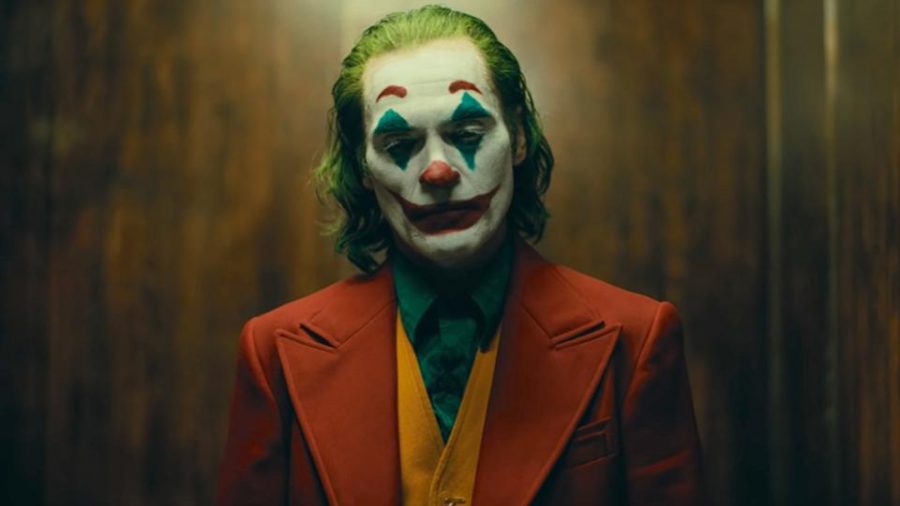It seems like every year there is a movie, performance, or book that the American public completely pounces on and blows out of proportion. Currently, the spotlight is on Todd Phillips’ “Joker.” Due to excessive and unnecessary commentary, the film is highly controversial.
The film revolves around protagonist Arthur Fleck, portrayed by Joaquin Phoenix. Failing to make it as a stand-up comedian due to his awkward tendencies, such as uncontrollable laughter, and led on by his unstable mental state, Fleck spirals down a path of uncontrollable hysteria. Unable to withstand societal isolation and disregard, Fleck transforms into the Joker, succumbing to his violent impulses and allowing disorder to prevail. Rather than being condemned for his vicious atrocities, the murders he commits are worshipped. Individuals begin to place their support behind him by wearing clown masks, rioting, and setting fire to Gotham City. Consumed by this praise and attention, Fleck discovers comfort in his new identity and finally feels noticed by others.
So how does our society respond when encountering any idea that may not be the most comforting? People criticize the source. While it is both natural and essential for controversy to arise in any society, the American public has ultimately become too sensitive.
What is generating the most controversy is the film’s “sympathetic” portrayal of the psychological maniac. Considering that our society is experiencing a period burdened by recurring mass shootings, critics demand that the turbulent nature depicted in “Joker” should be condemned rather than embraced and sympathized with.
To me, the idea that a single movie can provoke violent behavior is improbable. Every film ever produced arguably has real-world implications. Considering gun violence is prevalent in thousands of movies, why is American society so quick to denounce this single depiction of disorder?
Prior to “Joker’s” premiere in the United States, the movie received commentary over its violent illustrations. In light of the 2012 mass shooting that occurred at the premiere of “The Dark Knight Rises” in Aurora, Colorado, both family members and friends of the victims revealed their concern prior to the new movie’s upcoming release. In a letter to Warner Bros., these individuals said, “we’re calling on you to use your massive platform and influence to join us in our fight to build safer communities with fewer guns”
In response, Warner Bros. released a statement regarding the intentions of the film: “make no mistake: neither the fictional character Joker, nor the film, is an endorsement of real-world violence of any kind. It is not the intention of the film, the filmmakers or the studio to hold this character up as a hero.”
While it is respectable that the authors of the letter called for action rather than exclusively voice their criticisms and animosity toward the film, the reactions to this movie are irrational. The fact that Warner Bros. felt compelled to clear up their intentions in producing this film only confirms the sensitivity that is prevalent in our society. The essence of film is that the message is up for personal interpretation. Thus, it is neither the responsibility of the filmmaker nor the entertainment company to clarify their intentions or assume how a certain audience may perceive the filmWhat is meant to be an expression of opinion and a form of entertainment has become lost in a sea of criticism and sensitivity.
Rather than solely focusing on the violence depicted in this movie, critics of mass violence should equally consider the connection between mental illness and violent tendencies. The disregard toward the depiction of mental illness in this film encourages me to believe that critics are unfairly and unreasonably using “Joker” as a platform to criticize a broader idea that is not implied by the film.
Other critics have brought politics into the discussion: “the true nature of the movie’s appeal is actually broader: It’s an insidious validation of the white-male resentment that helped bring President Donald Trump to power,” said CNN writer Jeff Yang.
The fact that everything gets related back to politics is exactly why our society continues to become increasingly polarized. How can American society expect individuals to want to share their ideas and talents when inflated criticism only awaits them in the future? While everyone is unquestionably entitled to their own opinions, there is an extent to which people take offense to things that do not possess an underlying message or goal beyond entertainment.
Film, along with any form of expression, is meant to encourage people to think, feel, and debate. Considering that both violence and mental instability are both realities in American society, these depictions should not be concealed or castigated, but rather discussed. If these absurd reactions to the most trivial ideas continue, then what will be acceptable for society to discuss?
Let’s face it: American society has become excessively sensitive to the point where forms of expression aimed to make people laugh or think have become ruined by nonsensical criticism. Our freedom of speech, along with the yearning to express one’s ideas and views, are ultimately being jeopardized by our society’s fragility.



















































































































Anonymous • May 24, 2020 at 8:21 pm
5
Anonymous • Nov 8, 2019 at 9:53 am
4.5